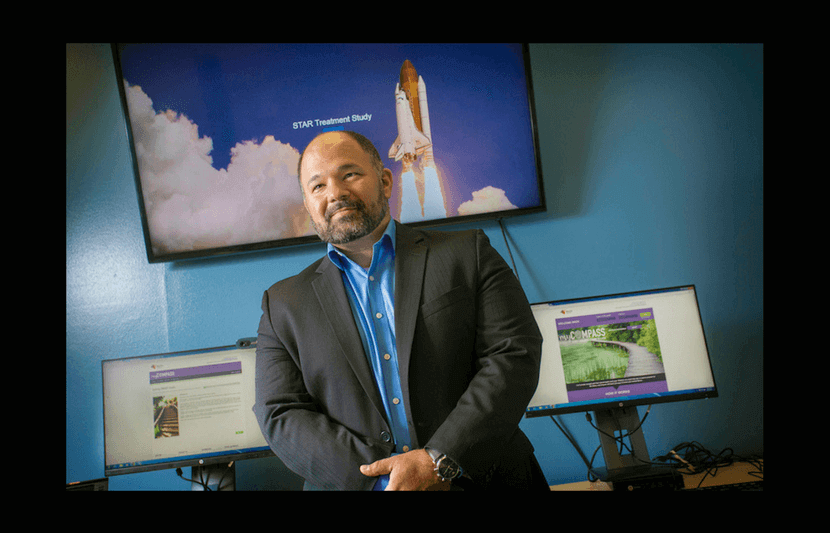Adam Gonzalez, an assistant professor at Stony Brook University’s School of Medicine, is currently leading a clinical trial of an e-mental health tool, called myCompass, to determine if the tool would help relieve stress, anxiety and/or depression in astronauts. The goal of the clinical trial is to gather information on the delivery of e-mental health treatments to astronauts during lengthy space missions.
Gonzalez is collaborating with researchers from the Black Dog Institute, a mental health services organization located in New South Wales, Australia, to evaluate myCompass for that purpose.
The mental health program was designed by a team of researchers at the Black Dog Institute. It is an interactive self-help tool that provides astronauts with interventions based on physiological evidence. These interventions, which include techniques such as cognitive behavior therapy, are delivered completely by online platforms. The program is fully automated and completely free. It also allows users to create personalized plans that can be used anytime — day or night — on portable devices, such as smartphones, tablets and computers.
While myCompass has been studied before with results showing that it is effective in cases involving mild-to-moderate depression, anxiety and stress, the sole focus of this study is to determine its effectiveness for astronauts.
The clinical trial of 135 “astronaut-like” individuals officially started on September 18, but it actually started two years ago when Gonzalez, who is also the founding director of the Mind-Body Clinical Research Center at the university, received a four-year $1 million dollar grant from the National Aeronautics and Space Administration (NASA), so he could proceed with researching e-mental health tools that can help astronauts.
The participants in the trial are “astronaut-like’ in the sense that they are “demographically similar to astronauts” in terms of their education, health, and stress-levels. Some participants are graduate students while others are physicians or simply local residents.
The participants are randomly categorized by one of the three conditions — stress, anxiety or depression — and treated over seven weeks, so the tool can be tested in isolation and with myCompass intervention that’s supported by delayed therapist contact via text messages or via recorded video messages, which is purposefully timed to reflect a delay of up to 44 minutes that astronauts encounter when they are in space.
“For the current study, we are most interested in how effective different communication methods are for providing support in context of an internet-based psychological intervention, specifically when there is a delay in real-time communication,” Gonzalez said. “When astronauts go on long duration space missions, NASA estimates a delay of 44 minutes in communication with ground-based crew. The research we are doing has the potential to help inform the best method for communicating for mental health purposes.”
Four weeks after the treatment, the progress and the experience of the participants will be evaluated.
According to the university’s press release, this is the first clinical trial involving ‘astronaut-like’ adults, which will assess the effectiveness of e-mental health programs at times when astronauts don’t have access to real-time and face-to-face help from therapists but can get support in other ways, such as video-messaging or text-based messaging with a therapist.
If the trial proves successful, e-mental health tools could prove an essential part in eliminating a significant problem in space travel — the stress, anxiety and/or depression that commonly plagues astronauts during missions.
“Astronauts are at a high risk of experiencing mental distress for a range of reasons: they are generally extremely high achieving; on mission they experience long-term social isolation; they confront ongoing physical strain and mental challenges (including persistent threats to their safety); and they have limited access to the types of ‘supports’ that many of us take for granted, including ready access to friends and family, and physical activity,” Dr Janine Clarke, who is responsible for overseeing Black Dog Institute’s myCompass program, said in a statement.
Gonzalez believes in myCompass as a treatment option for stress, anxiety and depression. “The great thing about the program is, it provides transdiagnostic skills to manage a variety of mental health concerns – meaning the skills have broad applications to help with managing anxiety, depression and stress,” he said.
The study, according to Gonzalez, should provide NASA with the information necessary for it to take care of the mental health of its astronauts.
“This research is critical to inform the best way for NASA to care for the mental health needs of astronauts during missions to Mars and other long duration space travel,” Gonzalez said in a statement.
The program, according to Gonzalez, could also be useful in rural areas around the world where there is less access to mental health care providers. It could also help improve the quality of, and access to, mental health care in the U.S.
“Australia, in general, has been ahead of the curve when it comes to mental health,” said Gonzalez. “There have been large population studies in which primary care doctors actually prescribe an internet-based psychological intervention before considering medications. I think this technology can vastly improve mental health care in the US, especially in terms of improving access to care.”



